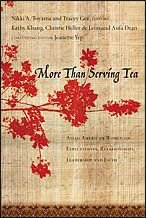Thursday, January 18, 2007
A collection of questions
At book discussions, readings and other Q&A, these questions stick out.
Why did you choose these struggles for Asian American women? Do Asian women in Asian countries have the same struggles?
Women in the Asian diaspora have an interesting dilemna. When their families immigrated, gender roles froze in time. If they immigrated in 1950, their expectations of what a Asian woman froze in 1950. In Asia, these gender roles continue to redefine and evolve in response to changes in the society. Gender roles are dynamic. But, for immigrants watching their young women deviate from these roles (1950s, 1970s, 1920s), changes usually equates "becoming Americanized". It goes both ways. I watch Christian churches in Japan that are frozen singing the hymns that were popular when their pastor came to the US to go to seminary. You can't blame the parents for wanting their young daughters to retain their culture. Our book tries to address and redefine Asian Pacific Islander is more dynamic and fluid terms.
What creates the "friends/enemies" dynamic for Asian Pacific Islander (API) women?
Asifa does a great job in a chapter talking about friendships for API women. She talked about the friendship (and enemy) dynamic. It's weird what a "communal" mindset will do. Suzy might be a close friend--but parents use that same friend to set up the "impossible" standard that you will never achieve. Perhaps you are the impossible standard that alienates your friends. Its a weird dynamic when friendships are personal but also communal.
My favorite quote on this: "Can't you be like _________?" (Fill in the name of your nerd cousin, valedictorian friend, or other mother appointed rival.) Phoebe Eng, author of Warrior Lessons
You do a good job of breaking down images and stereotypes. But images are so powerful and important. What image would you hold up for Asian American women to grow into, strive for?
Good question. Christie did a great job of describing the image--challenging in a respectful way, strong and cognizant of others, etc. But I continue to mull over this...what image would capture the strength and resilence that comes from surviving struggles.
Why did you choose these struggles for Asian American women? Do Asian women in Asian countries have the same struggles?
Women in the Asian diaspora have an interesting dilemna. When their families immigrated, gender roles froze in time. If they immigrated in 1950, their expectations of what a Asian woman froze in 1950. In Asia, these gender roles continue to redefine and evolve in response to changes in the society. Gender roles are dynamic. But, for immigrants watching their young women deviate from these roles (1950s, 1970s, 1920s), changes usually equates "becoming Americanized". It goes both ways. I watch Christian churches in Japan that are frozen singing the hymns that were popular when their pastor came to the US to go to seminary. You can't blame the parents for wanting their young daughters to retain their culture. Our book tries to address and redefine Asian Pacific Islander is more dynamic and fluid terms.
What creates the "friends/enemies" dynamic for Asian Pacific Islander (API) women?
Asifa does a great job in a chapter talking about friendships for API women. She talked about the friendship (and enemy) dynamic. It's weird what a "communal" mindset will do. Suzy might be a close friend--but parents use that same friend to set up the "impossible" standard that you will never achieve. Perhaps you are the impossible standard that alienates your friends. Its a weird dynamic when friendships are personal but also communal.
My favorite quote on this: "Can't you be like _________?" (Fill in the name of your nerd cousin, valedictorian friend, or other mother appointed rival.) Phoebe Eng, author of Warrior Lessons
You do a good job of breaking down images and stereotypes. But images are so powerful and important. What image would you hold up for Asian American women to grow into, strive for?
Good question. Christie did a great job of describing the image--challenging in a respectful way, strong and cognizant of others, etc. But I continue to mull over this...what image would capture the strength and resilence that comes from surviving struggles.
Subscribe to:
Post Comments (Atom)

No comments:
Post a Comment